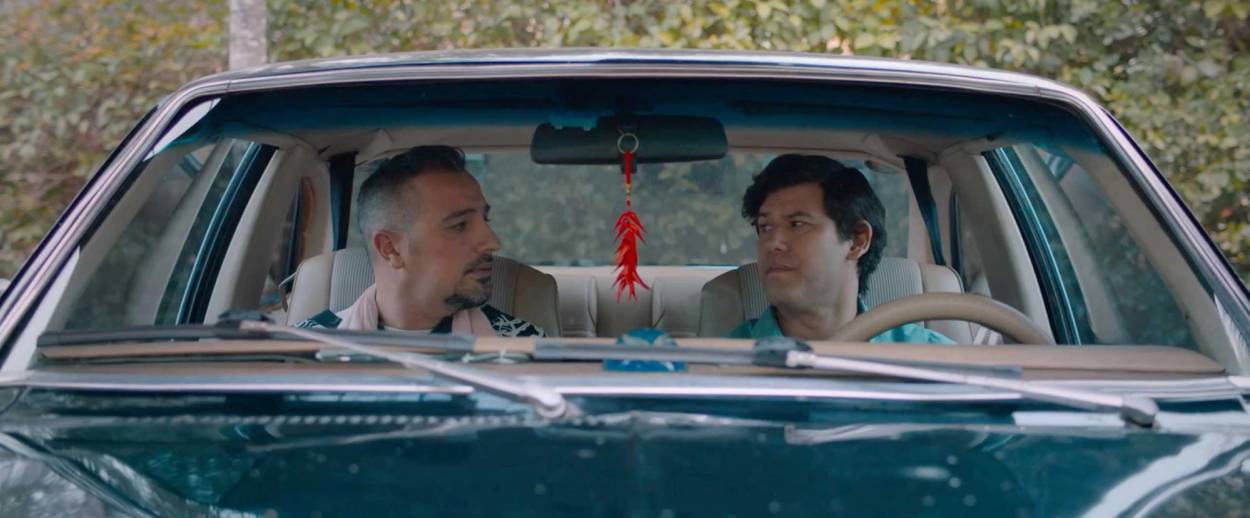Israel’s ‘Maktub’ Is the Best Theological Comedy on Netflix Right Now
Imagine a hybrid of ‘It’s a Wonderful Life’ and ‘Pulp Fiction,’ and you’ve got this delightful film




If you’ve ever tried it, you know that prayer is a risky business. It starts off awkwardly, with one party, mortal, approaching the other party, divine, without the assurance of reception or the expectation of reply. We ask, hastily, for things it is not in our power to grant, and we hope, frivolously, that the Great Someone is listening. No sooner does prayer end than anxiety begins. Will our prayer be answered? And if not, what does that mean about our relationship with our Creator?
These, more or less, are the questions informing Maktub, an immensely charming Israeli comedy, now streaming on Netflix. As the film begins, we meet two smooth-talking gangsters. Their names are Chuma and Steve, but you may be excused if you confuse them for Vincent Vega and Jules Winnfield, the two besuited thugs played by John Travolta and Samuel L. Jackson in Pulp Fiction. They comment on the quality of a chef’s carpaccio as they beat him silly, and somewhere, you imagine, St. Tarantino is smiling.
But Chuma and Steve’s cool isn’t long for this world. A few minutes into the film, they walk into a restaurant’s bathroom, are startled by a loud explosion, and emerge to discover that everyone else in the restaurant was just killed in a suicide bombing. (It’s a comedy. I promise). Shaken to the core, they rush to the Kotel to say Birkat HaGomel, a prayer of thanksgiving after a potentially life-threatening ordeal. And there, among the stones and the hushed prayers, they have an epiphany: They’ve been gifted their lives, and they’ll spend them helping others in need. Looking at the world’s largest repository of pleas, they remove random notes from the wall’s crevices, read them, and set out to help the poor souls who wrote them get exactly what they wished for.
What follows is sort of like It’s a Wonderful Life, if only George Bailey had a mean uppercut, a best buddy, and an endless supply of one-liners. Or, to note another Israeli export celebrated on Netflix these days, a sort of Fauda, if only all the characters finally realized that so much stress is bad for your health and that even the toughest guys must stop every now and then and scour the shuk in search of the perfect bouquet of herbs.
But the movie’s real pleasures lie beyond its sweet plot and exuberant spirit. As soon as Chuma and Steve embark on their cherubic undertaking, they come across a thicket of theological complications. Does God truly help those who help themselves? Were the rabbis right when they taught that nothing could withstand the force of our will? Or are some things simply beyond our control, the best of intentions be damned? Helping a nebbishy accountant get a raise is one thing—all it takes is dangling his meaty boss out a window and presto—but how to help a woman unable to conceive? And how do two vigorous men accustomed to getting their way—or else—come to terms with those intractable things they haven’t the power to change?
These are not only the questions that trouble kind-hearted thugs. They bedevil parents, too, eager to protect their children and yet mindful that none of us can shield our loved ones from the rain that inevitably falls down on every life. Chuma and Steve learn that lesson the hard way: Emulating the Heavenly Father by making wishes come true is one thing, but being earthly dads to real children is a task of a very different order. And when real children appear on the scene—including a sweet and soulful boy who may or may not be Steve’s—the two are forced to go where no Tarantino character has gone before: into the parental realm of deep bonds and emotional commitment.
That’s a tall order for an airy comedy, but Maktub delivers that rare blend of the cool and the warm. One moment, you’re grooving as Chuma, a moon-faced strongman with the fashion sense of a 1970s disco enthusiast, puts on a wig and a dress to go collect notes from the women’s side of the Kotel—only helping men, the two agree early on in a hilarious bit of dialogue, would be very discriminatory and an affront to the spirit of progress; the next, you’re somewhere close to tears when you learn just why Steve has been avoiding the boy who claims to be his son.
How is this balance achieved? The answer is in the movie’s name: “Maktub” means “it is written,” an expression many believing Israelis use to suggest that everything in life is foreordained and decreed by God. Steve and Chuma’s real challenge, then, isn’t just to make a few wishes come true or even to learn how to be better men and better fathers. It’s to understand that most profound and baffling of all rabbinic exhortations: Everything is foreordained, and permission is given. It means, as the two lovable mobsters learn, that the divine plan is good and great, but it’s not much use to you unless you believe it and act on it. Learn to fear and love God, and his powers will deliver you; run away—from your faith, from your responsibilities, from yourself—and not even God can save you. It’s a heady message, and it takes two unlikely angels like Steve and Chuma to make us listen.
Liel Leibovitz is editor-at-large for Tablet Magazine and a host of its weekly culture podcast Unorthodox and daily Talmud podcast Take One. He is the editor of Zionism: The Tablet Guide.